The most dangerous virus
Which gives only stress
Which gives only sorrow
Is comparison
It’s difficult not to compare ourselves with others. We are, in one way or another, connected. As members of the same species, same society, same neighborhood, same office, same classroom, same hairdresser. We look at one another and compare: they’re wearing black; I’m wearing red; they’ve got high heels on; I have sneakers; their skin is brown; mine is white.
The issue with comparison is the fact that it often comes accompanied by judgment. An inadvertent game of ‘who’s better.’ It’s natural yet toxic to both parties. And when the differences prove to be more than one has experienced before, we hide away from the judgmental stares.
This is the story of Amara Aleman, who was diagnosed with vitiligo in 2017. This is her story of acceptance. This is her story of self-love. She has become an internet icon and a motivator to many with the same condition. Let’s dive into it.
Throughout this article, I have featured the poem ‘Virus’ by Kinjal Sanghavi, a writer, who has been dealing with vitiligo since her early teenage years.
28-year-old Amara Aleman has become an icon for embracing her vitiligo spots by painting their outlines, turning them into a colorful, eye-catching feature
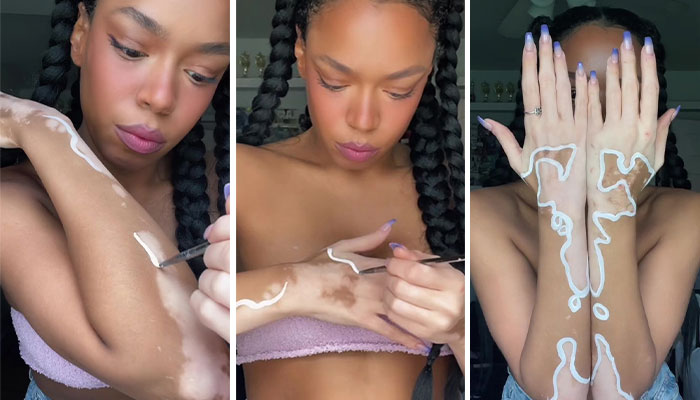
Image credits: amara_artspots
We compare our life with others
But we sideline the fact that
Everyone’s journey is different
Everyone is born with a different destiny
And
28-year-old Amara Aleman has become an icon for embracing and showcasing something which suddenly took over her life and caged her in an imaginary prison, making her reimagine herself. That something was a sudden onset of vitiligo.
Amara calls her creations ArtSpots, describing them as her outlet for creativity. She usually matches their colors to the outfit she’s wearing
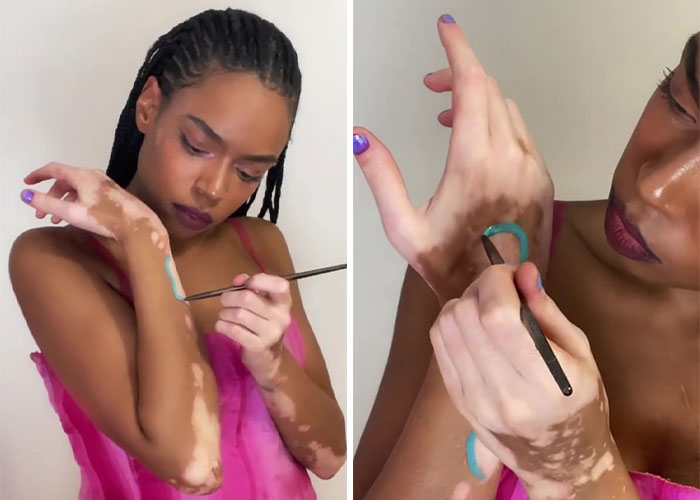
Image credits: amara_artspots
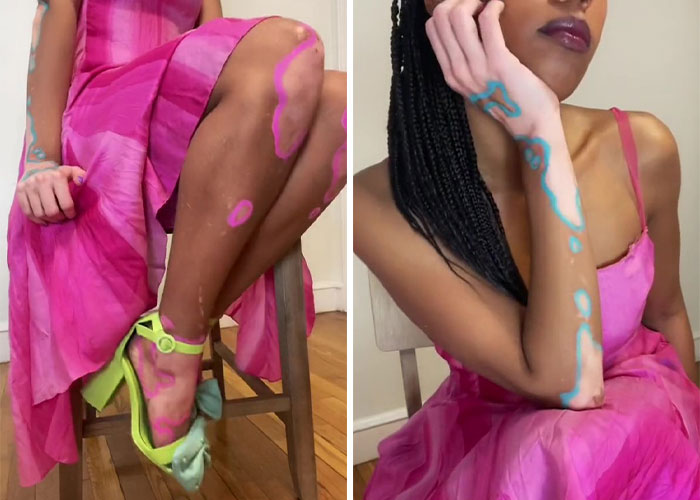
Image credits: amara_artspots
A unique art form and means for self-expression caught the attention of thousands online when Amara started posting pictures and videos of her highlighting her vitiligo spots rather than hiding them away.
She calls them ArtSpots, and they’re her outlet for creativity. Amara usually matches the colors of the ArtSpots to her outfit, turning her vitiligo into an eye-catching feature.
Everyone gets according to their deeds
Due to this constant comparison
We start developing an inferiority complex
About our life
About our achievement
And
Vitiligo is an auto-immune skin condition, in which pigment-producing cells disappear, resulting in light patches of skin that can appear anywhere on the body
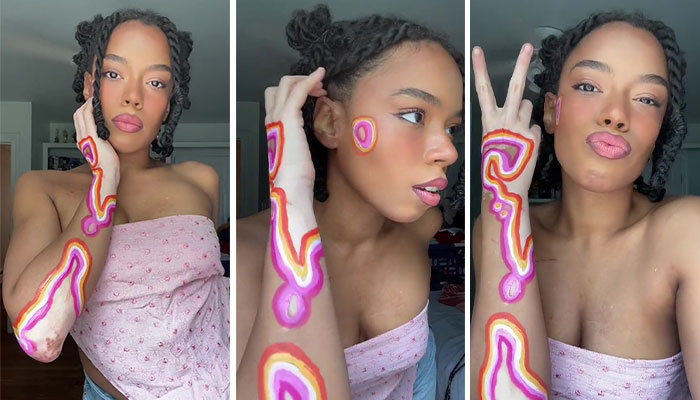
Image credits: amara_artspots
According to Dermatology Inc., vitiligo is a condition in which pigment-producing cells in the skin and hair disappear, resulting in patches of lighter skin that can appear anywhere on the body—though certified dermatologist Michele Farber of the Schweiger Dermatology Group argues that they are most common on sun-exposed areas such as the face, upper chest, backs of the hands, arms, and feet.
“The body attacks melanocytes in the skin, hair, eye, inner ear, and mucous membranes,” explains board-certified dermatologist Heidi Waldorf. Either something inside the body prompts it to attack its own pigment, or a person’s melanocytes are inherently defective and unable to fully function, yet experts are unsure of the details. In sum: There’s still a lot of uncertainty about vitiligo, but everything boils down to the melanocytes.
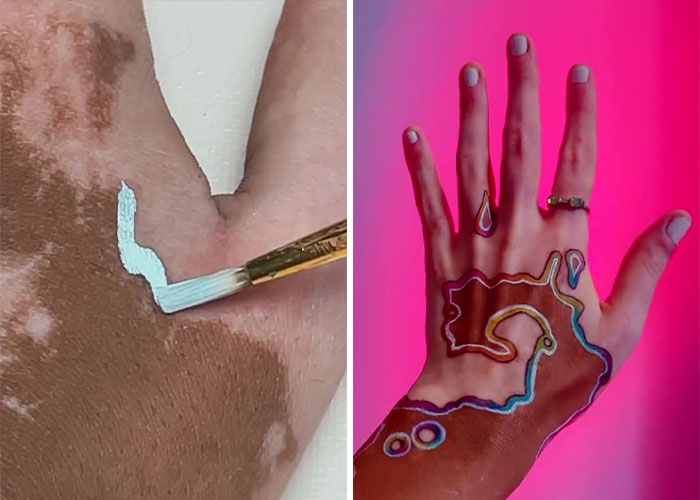
Image credits: amara_artspots
Back in 2017, Amara noticed a few white patches on her palms. Soon they spread up her forearms. The diagnosis “devastated” her, leading her to self-isolate
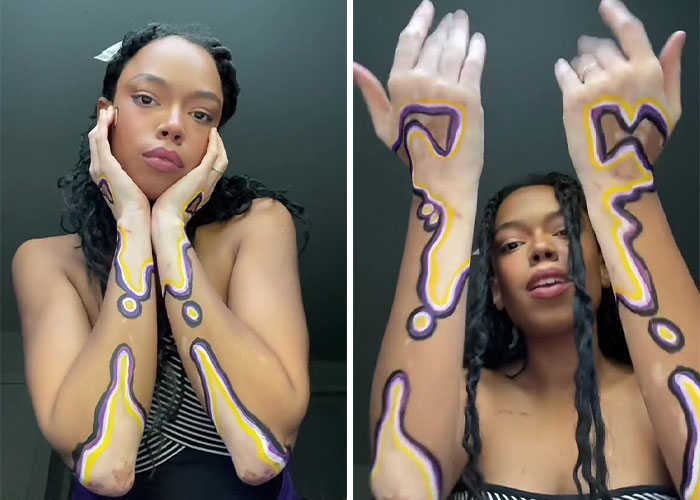
Image credits: amara_artspots
Vitiligo is typically a lifelong condition and, at the present moment, there is no cure. Michele explained that people aren’t typically born with depigmentation, nor can they ‘catch it’ from anyone else. Rather, the patches develop and usually set in before the age of 20. This is what happened to Amara.
Back in 2017, Amara noticed a few white patches had appeared on her palms. Soon they spread up her forearms and, concerned, she went to a doctor. The diagnosis “devastated” Amara, leading her down a path of self-isolation.
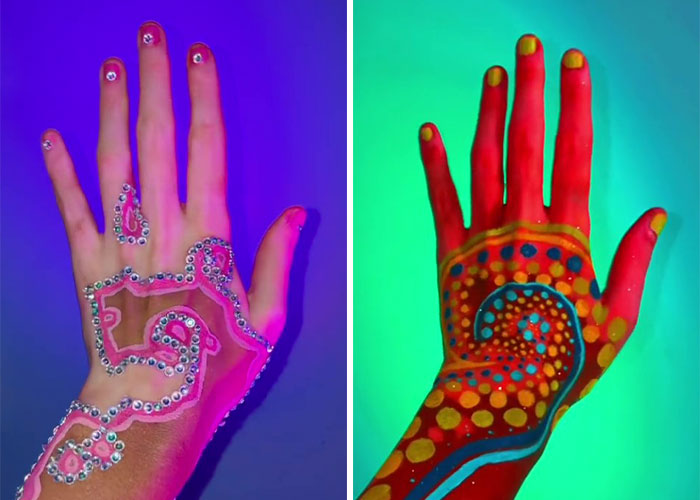
Image credits: amara_artspots
“I didn’t know anyone else with vitiligo in my life, and I didn’t think my friends or family would understand,” she said. Thankfully, they showered her with support
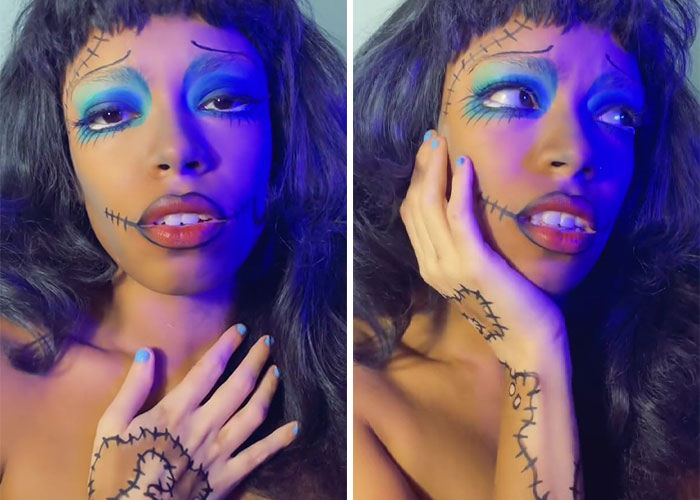
Image credits: amara_artspots
“I was working as a dancer performing in theater… and completely stopped dancing,” she told BuzzFeed. “I didn’t know anyone else with vitiligo in my life, and I didn’t think my friends or family would understand.”
Sadly, it seems that the most common side effect of vitiligo is psychological. “Our appearances can affect our self-esteem, our moods and emotions, and the way we interact with others,” explains Evan Rieder, a board-certified dermatologist and psychiatrist. “Issues of self-esteem and self-confidence are common, and there may be a major impact on quality of life.”
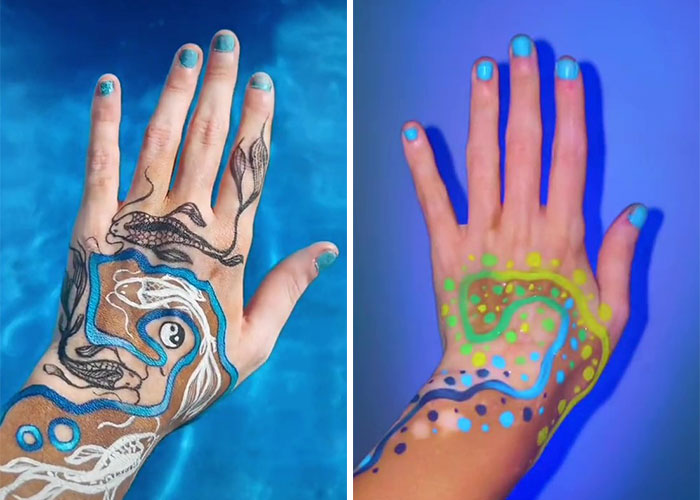
Image credits: amara_artspots
“My parents were the first step in me coming to terms with the condition,” she said. “So with their advice, I started going out a bit more and seeing friends again”
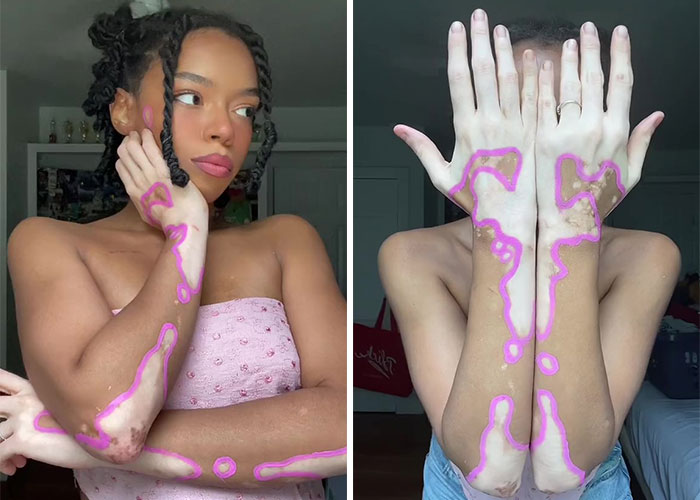
Image credits: amara_artspots
“I spent the next year hiding away from everyone,” she continued. “I rarely left the house, and when I did, I was covered up head to toe and either [wore] long clothing or camouflage and makeup. There was so much uncertainty that I wasn’t ready for. I didn’t know if the condition would keep spreading… and it wasn’t something I was ready to face, so I spiraled into a pretty deep depression and anxiety.”
About us
With comparison
Happiness becomes invisible
Success becomes tiny
And
Life becomes boring
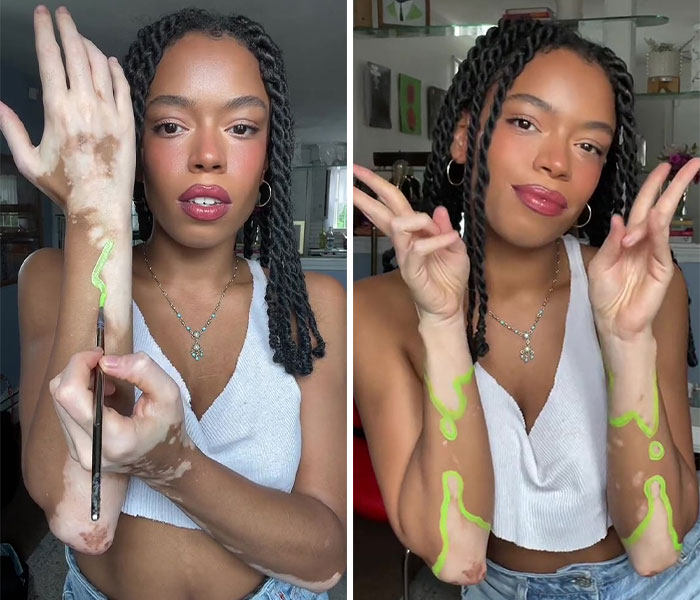
Image credits: amara_artspots
She fell in love with an old friend and believes that this relationship provided the safe space she needed to fully accept herself and her new skin
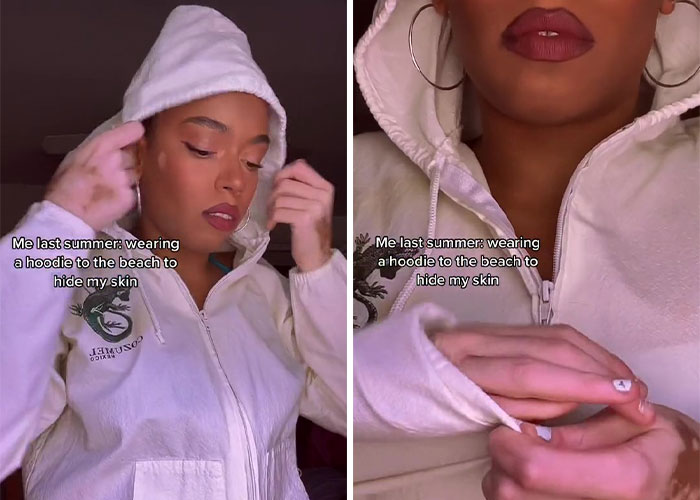
Image credits: amara_artspots
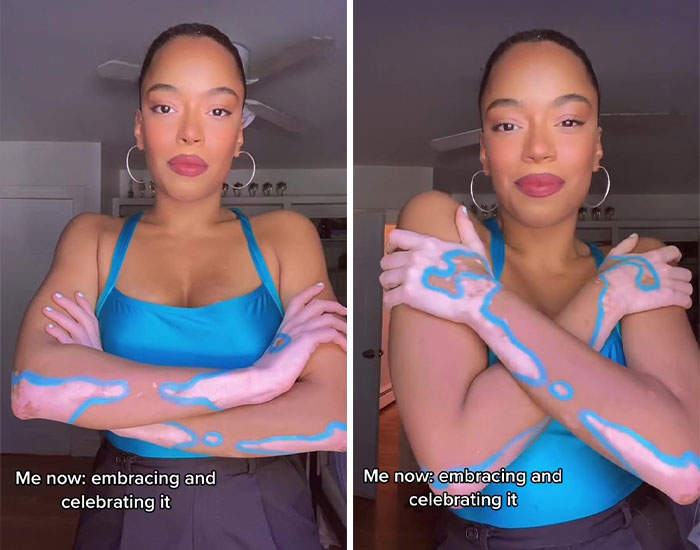
Image credits: amara_artspots
Thankfully, she found solace and support in her family and friends. “My parents were the first step in me coming to terms with the condition, because they never treated me any differently and always encouraged me to try to see the positive in it,” she said. “So with their advice, I started going out a bit more and seeing friends again.”
She reconnected with an old friend and they hit it off, falling in love and becoming a couple. Amara believes that this relationship provided the safe space she needed to fully accept herself and her new skin. “[The relationship] really allowed me to tap into my creativity from a much more loving and accepted place,” she said.
Amara started posting pictures of her ArtSpots online, as well as videos showing off the process itself, and the rest is history
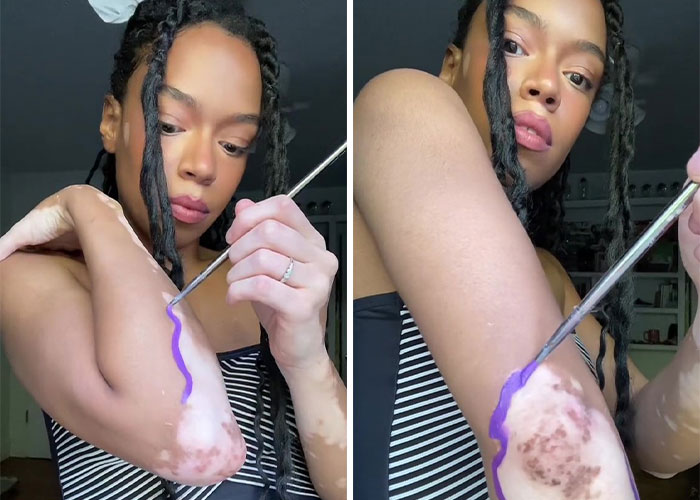
Image credits: amara_artspots
Things started to look up for Amara. “I’ve always been really creative, so the idea to create art with my skin kind of came naturally, but once I saw the reception online and read the comments [about] how positively it was affecting those with the condition, the ideas really flourished,” she said.
“The main inspiration behind what initially sparked ArtSpots is the idea of taking lemons and making lemonade. Life will continue to be unpredictable and it will defeat you if you’re not able to adapt and see beauty in imperfections or differences.”
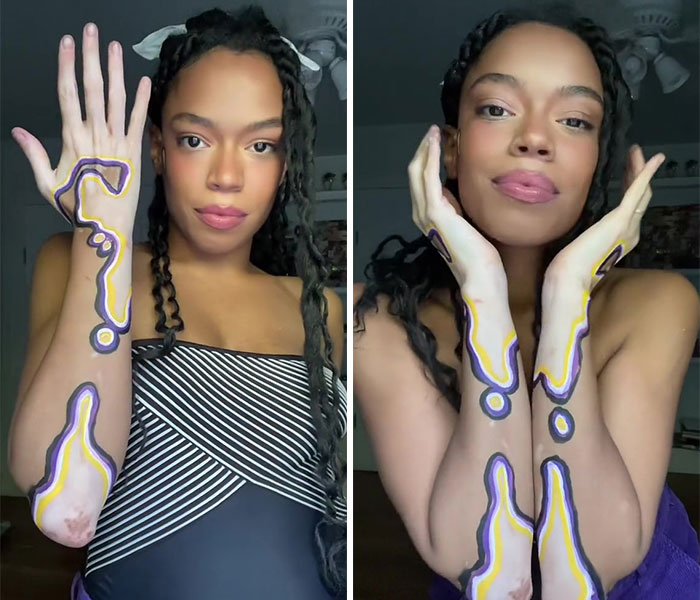
Image credits: amara_artspots
The unique art form caught the attention of thousands, with many praising her bravery and others with vitiligo taking inspiration from her and becoming more confident
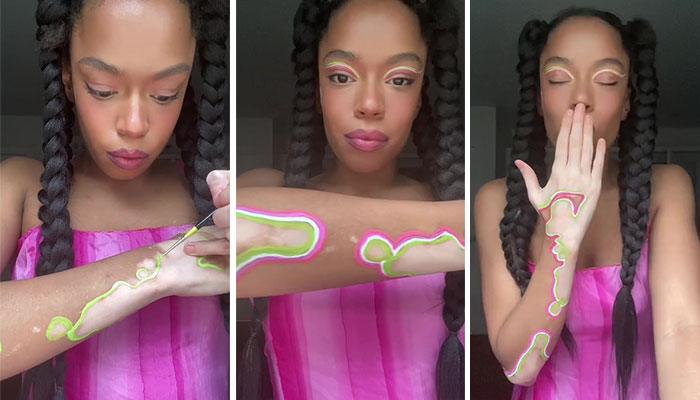
Image credits: amara_artspots
Her makeup, story time, and Get Ready With Me–style videos have garnered thousands of views, some even going viral, with millions of people admiring her work. Not only is it a beautiful and artistic expression of self, but also an inspiration and boost of confidence to all those uncomfortable in their own skin or ashamed of the condition.
“I share these looks because it’s a therapy for me, it’s an outlet for me to create, and I really do enjoy doing it,” she said. “But whenever I get a comment from someone who has vitiligo or knows someone with the condition saying that they’re inspired by my art, it’s almost surreal.”
“I remember how hard it was for me to accept my skin enough to celebrate it, but I realize every time I get a comment like this why it’s so important for me to continue.”
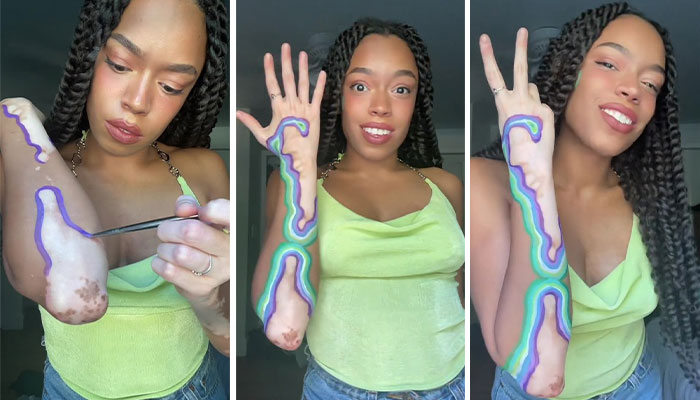
Image credits: amara_artspots
“The main inspiration behind ArtSpots is the idea of taking lemons and making lemonade,” she said, encouraging others to expand their view of beauty
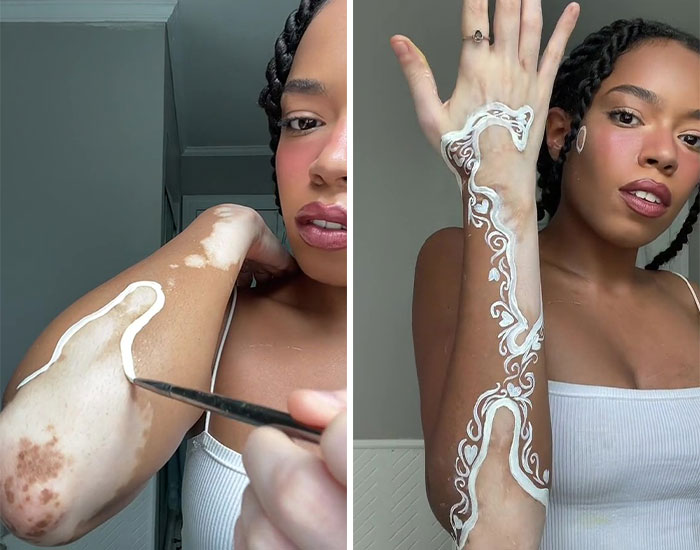
Image credits: amara_artspots
“I hope to continue sharing this art form in spaces that will help change the narrative around what is beautiful,” she told BuzzFeed. “Representing the community and continuing to spread awareness and knowledge of the condition to reduce the stigma and ignorance around it truly inspires me on a daily basis.”
According to the Vitiligo Foundation, nearly 1% of the population is affected by vitiligo, with around 70-million people across the world having the condition. More research is needed to fully understand it and better treat it. Until then, we should embrace the uniqueness that comes with the condition.
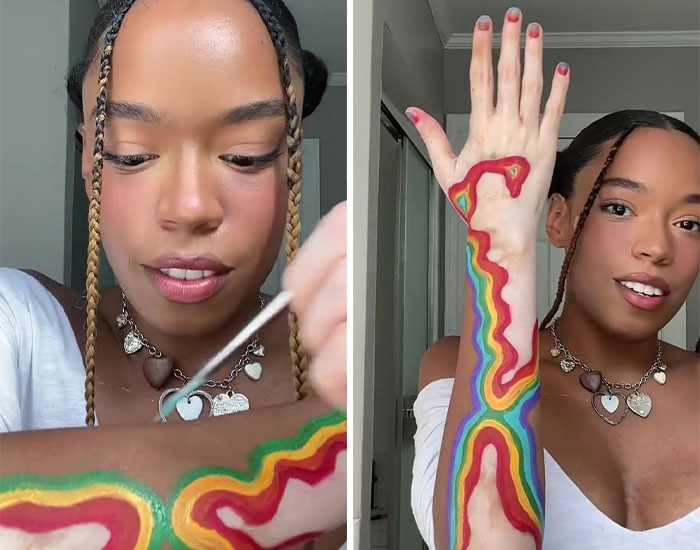
Image credits: amara_artspots
Amara hopes to continue representing the community and spreading awareness of the condition to reduce the stigma and ignorance. We wish her all the best!
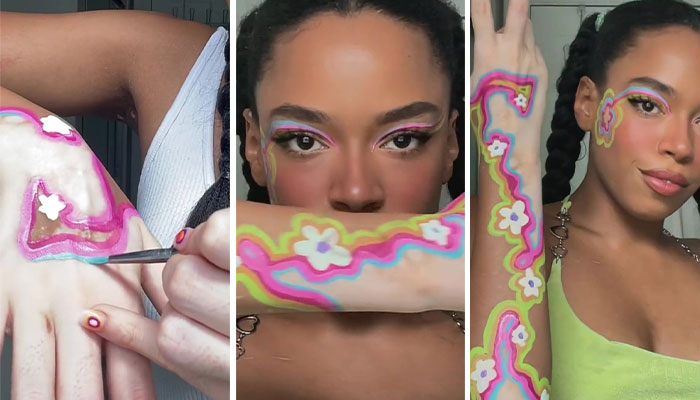
Image credits: amara_artspots
We wish Amara all the best in her creative journey and can’t wait to see what she comes up with next! Let us know your thoughts in the comments below, and don’t forget to upvote and follow the author for more inspiring and educational content! Arrivederci!
Enjoy your own journey
Learn from your mistakes
Celebrate your success
But never ever get infected by the virus of
Comparison
The post This Woman With Vitiligo Is Highlighting Her Spots, People Applaud Her For Embracing Her Beauty first appeared on Bored Panda.
from Bored Panda https://ift.tt/QSIfPVz

